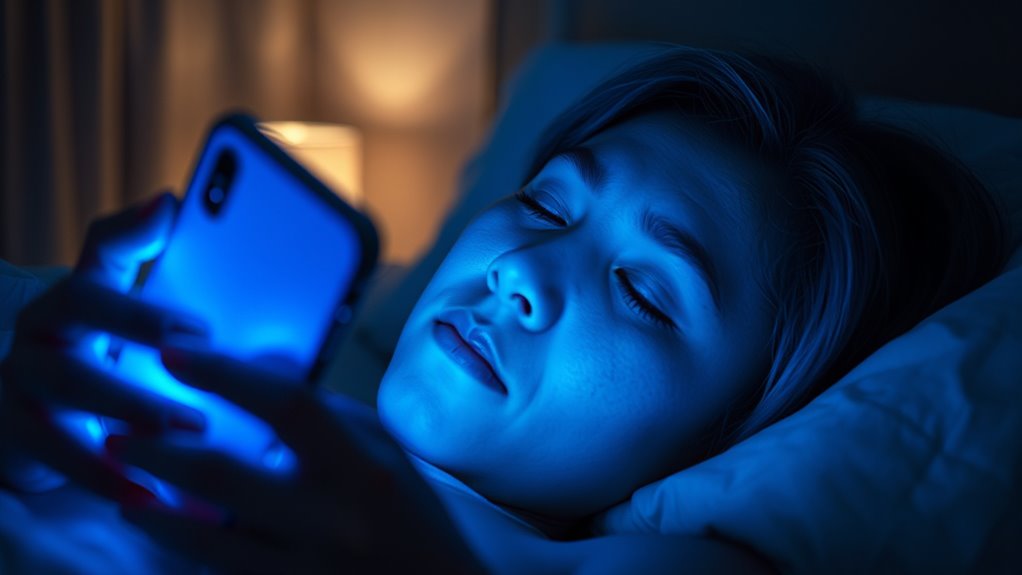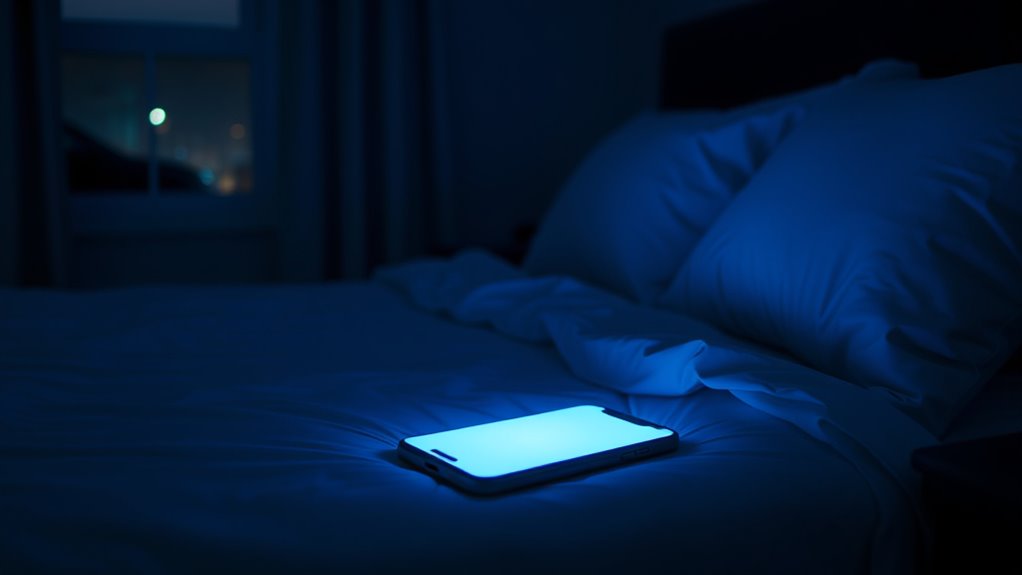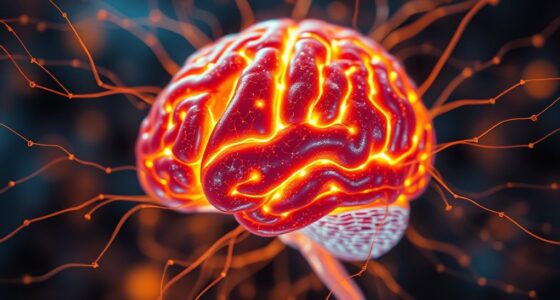Blue light from screens signals your brain that it’s daytime, which suppresses melatonin and disrupts your natural sleep cycle. This makes it harder for you to fall asleep, reduces sleep quality, and can cause you to wake up feeling unrefreshed. Over time, this circadian disruption may affect your mood, immune system, and overall health. Keeping exposure in check, especially at night, can help protect your sleep and recovery—learn more to improve your sleep habits.
Key Takeaways
- Blue light from screens suppresses melatonin, delaying sleep onset and disrupting your natural sleep cycle.
- Evening exposure to blue light makes your body perceive it as daytime, hindering circadian rhythm.
- Chronic blue light exposure can lead to poor sleep quality, fatigue, and long-term health issues.
- Using blue light filters or limiting screen time before bed supports better melatonin production and sleep.
- Recognizing blue light’s impact helps improve sleep habits, mood, immune function, and overall recovery.

Many of us spend hours in front of screens each day, unknowingly exposing ourselves to blue light, which can disrupt our sleep patterns. This type of light, emitted by smartphones, tablets, computers, and LED screens, can interfere with our body’s natural sleep-wake cycle. When blue light reaches your eyes, it signals your brain that it’s daytime, delaying the production of melatonin, the hormone responsible for making you feel sleepy. This suppression of melatonin isn’t just about feeling alert longer; it leads to circadian disruption, throwing off your internal clock and making it harder to fall asleep and wake up refreshed. Reducing blue light exposure in the evening can significantly help maintain your circadian rhythm and improve sleep quality.
As you continue to expose yourself to blue light in the evening, your body perceives it as daylight, which hampers your natural circadian rhythm. This disruption can cause difficulty falling asleep, reduced sleep quality, and shorter sleep duration. Over time, circadian misalignment may also impact other aspects of health, including mood, immune function, and metabolic processes. The more consistent your exposure to blue light during evening hours, the more likely you are to experience these negative consequences.
Your body’s internal clock relies heavily on light cues to regulate sleep and wakefulness. When blue light suppresses melatonin, your sleep cycle shifts, leading to delayed sleep onset and fragmented sleep. You might find yourself tossing and turning, unable to drift off until well past your usual bedtime. Even if you do fall asleep, the quality of that sleep might suffer, leaving you feeling tired and less refreshed in the morning. Chronic circadian disruption can also disturb REM and deep sleep stages, which are essential for physical and mental recovery.
To protect your sleep, it’s important to be mindful of your blue light exposure, especially in the hours leading up to bedtime. Reducing screen time and limiting blue light emissions during the evening helps your body produce melatonin naturally, supporting a healthy circadian rhythm. You can also consider using blue light filters or glasses designed to block blue wavelengths. Creating a relaxing pre-sleep routine, away from screens, allows your body to reset its internal clock and promotes better sleep quality. Recognizing the impact of blue light on melatonin suppression and circadian disruption empowers you to make smarter choices, ultimately enhancing your rest, recovery, and overall well-being.
Frequently Asked Questions
Can Blue Light Exposure Improve Alertness During the Day?
Yes, blue light exposure can improve alertness during the day. It boosts alertness enhancement by stimulating your brain’s natural wakefulness signals, helping you stay focused and alert. This increased alertness can enhance your daytime performance, making it easier to concentrate and complete tasks efficiently. Just be mindful to limit exposure in the evening, as it may interfere with your sleep quality.
Does Blue Light Affect Sleep Quality Differently for Adults and Children?
You might think blue light affects everyone the same, but it actually impacts adults and children differently. Blue light can disrupt your circadian rhythm and suppress melatonin more in children, making it harder for them to fall asleep. Adults may experience less pronounced effects, but the disruption still reduces sleep quality. So, keep screens away before bed to protect your sleep, especially for your kids’ health and growth.
Are There Specific Types of Screens That Emit Less Blue Light?
Some screen technology emits less blue light by adjusting the light spectrum. You should look for screens with built-in blue light filters or those labeled as low blue light or flicker-free. E-ink displays, like e-readers, emit minimal blue light and are easier on your eyes at night. Choosing these options helps reduce blue light exposure, potentially improving your sleep quality and recovery.
How Long Before Sleep Should I Stop Using Screens?
You should stop screen time at least 30 to 60 minutes before bed to improve your sleep quality. This allows your mind to wind down and your melatonin levels to rise naturally. Incorporate screens into your bedtime routines earlier in the evening, avoiding late-night exposure. Limiting screen time before sleep helps you fall asleep faster and enjoy more restorative rest, supporting your overall health and recovery.
Can Blue Light Glasses Fully Prevent Sleep Disruption?
Blue light glasses can substantially reduce sleep disruption, but they can’t fully prevent it. They block or filter blue light from screens, helping your melatonin production and easing your shift to sleep. However, other factors like screen time, caffeine intake, and stress also impact sleep quality. Using blue light glasses alongside good sleep habits offers the best protection against sleep disruption caused by tech use.
Conclusion
In your pursuit of peaceful, perfect sleep, remember that blue light can be a barrier. By balancing your bedtime tech use, turning off screens, and creating a calming cadence before bed, you can boost your rest and recovery. Don’t let digital distractions diminish your dreams—diligently detach from devices and dedicate time to unwind. Your restful, rejuvenating night awaits when you wisely ward off blue light’s barrenness, bringing better sleep and brighter mornings.









